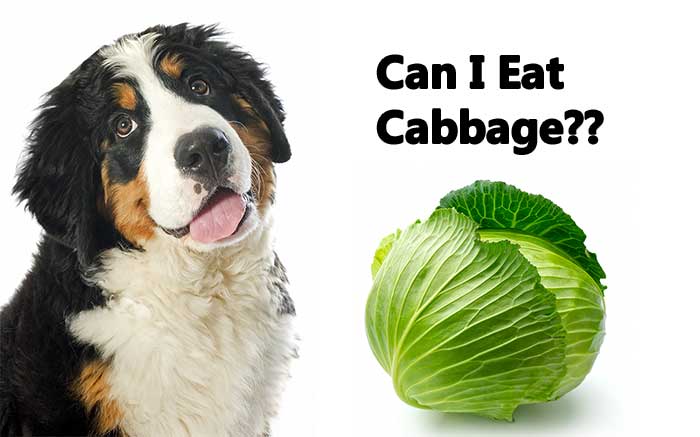You may be wondering “Is Cabbage Safe for Dogs?” Or “Can Dogs Eat Cabbage?”
The short answer to that question is yes; dogs can eat cabbage. In fact, many dogs love the vegetable for its savory taste and succulent leaves.
When it comes to cabbage, all forms are recommended for dogs. Be it the purple, savoy, or any other kind. But as you may expect, all plant matter can potentially cause side effects to dogs, especially if we give them more than their fair share of it.
Cabbage is notorious for causing gassiness. However, you’ll need to feed your pooch too much of the vegetable for it to experience gassiness.
Another common problem with cabbage is the presence of thiocyanate, which is associated with hypothyroidism. But then again, it all comes down to the quantity of the vegetable you give to your dog. And as we shall find out, the benefits of cabbage for dogs far outweigh the drawbacks.
Read on for a more detailed overview of the topic.
Different Types of Cabbage
Cabbage comes in various kinds based on their color and native country. The following are some of the main types of cabbage;
1. Green Cabbage
The green cabbage is characterized by smooth dark-to-pale green outer leaves, with white or pale green inner leaves. It’s the most abundant of all the types of cabbages out there.
As the green cabbage grows, the outer leaves tie around its head to keep the interior leaves safe from mechanical or pest damage. Green cabbage is further subdivided into three categories, namely; Domestic, Danish, and Pointed.
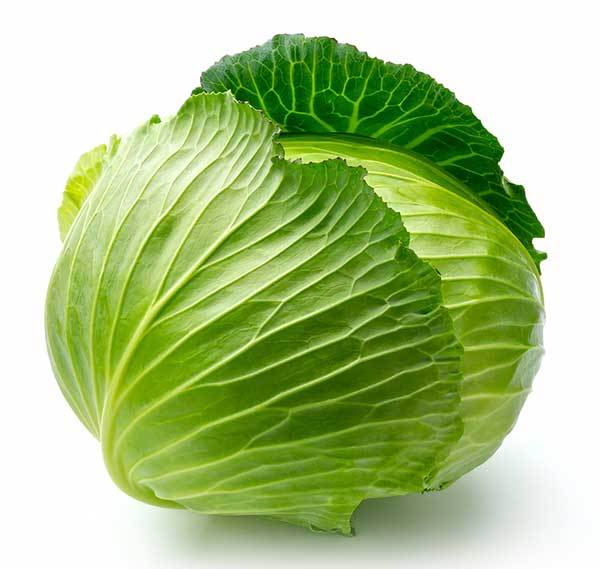
Domestic cabbages are characterized by their somewhat loose, flattened or round heads, with curled and brittle leaves.
The Danish varieties are often cultivated for the late-fall sale, as well as for storage during winter. Their heads tend to be oval or round. Since they’re intended to last longer, these cabbages are usually solid and compact.
Lastly, the Pointed variety of green cabbages are primarily cultivated for the spring sale. Their leaves are smooth, and their heads appear small and conical.
Due to its relative abundance, most dog owners find themselves offering the green cabbage variety to their pets. The cabbage is packed with nutritional elements alright. However, always establish the shelf life of the vegetable, especially when it comes to the Danish variety that tends to be preserved for extended use.
2. Red Cabbage
In terms of flavor, the red cabbage is nearly similar to the green type. The outer leaves of the red cabbage come in either deep ruby-red or purple colors. The veins or streaks are generally white.
Regarding the texture, the red cabbage tends to be tougher than the green kind. That makes it the less-preferred option, especially if you’re considering feeding your dog raw vegetable.
However, there’s a saving grace! Red cabbages are packed with more nutrients than their green counterparts. They are significantly higher in vitamin C and anthocyanins.
So if you were to choose the best cabbage variety for your dog based on the nutritional value, your best bet would be the red cabbage. And that helps settle the question – can my dog eat red cabbage?
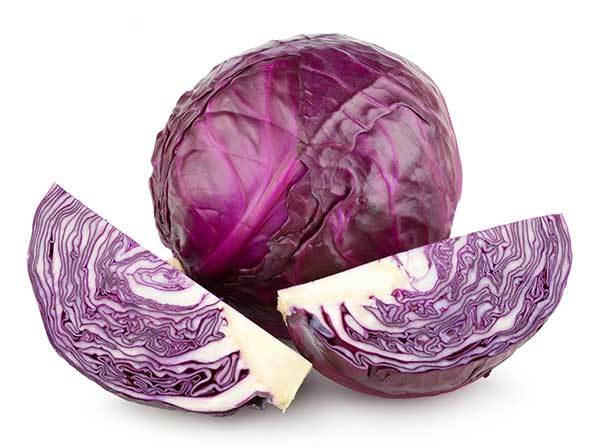
3. Savoy Cabbage
The savoy cabbage variety features crinkled yellow-green leaves that often appear ruffly.
Compared to the red and green cabbages, the leaves of the savoy cabbage are less compact. However, their texture is more delicate, and the flavor is milder.
It isn’t clear if the dog will like the milder flavor as animals have different taste buds from humans. However, the delicate texture is definitely a selling point.
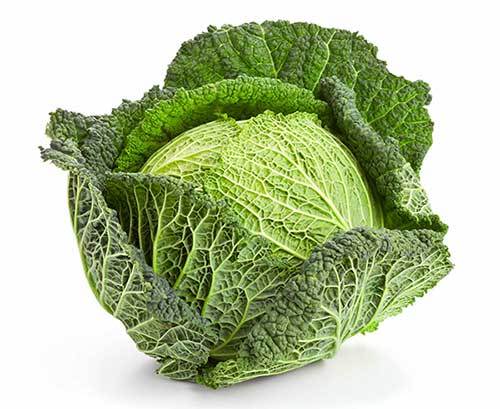
4. Tucsan Cabbage
This category of cabbage is marked by its mild-flavored taste and long, feathery leaves. The leaves are often dark-green, with white ribs.
You’re likely to confuse Tucsan cabbage with kale, due to their striking resemblance. Since it’s relatively new, there’s not much study on its nutritional value.
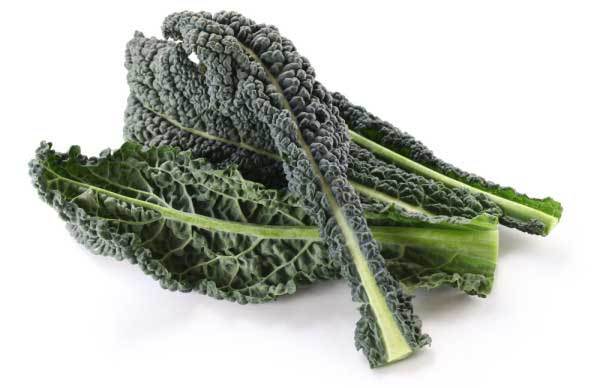
ALSO READ: Can Dogs Eat Broccoli? Safe or Not?
Health Benefits of Cabbage for Dogs
1. Improves Digestion
Indigestion is a common problem in dogs. And when it happens, it not only interferes with a dog’s eating habits. It also affects his entire body rhythm. Fiber is one of the most recommended remedies for indigestion, and cabbage contains an abundance of it.
Cabbage is especially rich in the gut-friendly insoluble fiber. Being insoluble means that this fiber cannot be broken down in the dog’s intestine. Therefore, it moves through the intestine, bulking the stool, and ultimately helping improve bowel movements.
Cabbage is also rich in soluble fiber. Soluble fiber acts as the primary fuel for gut-friendly bacteria. Therefore, it helps increase the number of such bacteria. Examples of gut-friendly bacteria include the Lactobacilli and the Bifidobacteria.
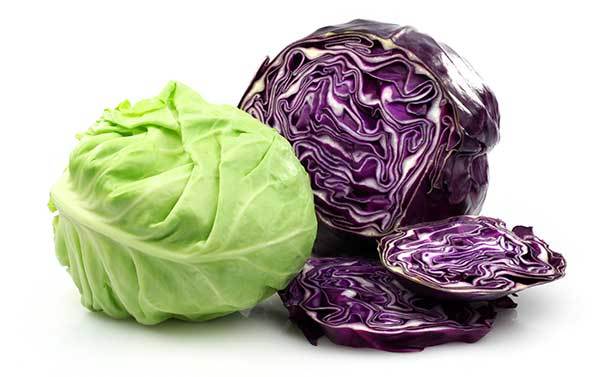
In addition to boosting the health of your canine’s gut, these bacteria also facilitate the synthesis of essential vitamins, such as vitamins B12 and K2.
Besides relieving indigestion, fiber is also lauded for its ability to suppress appetite and reduce food cravings. It creates a feeling of fullness after eating only a little food. Therefore, you can incorporate it into your canine’s diet if you’re looking to control his excessive eating habits.
Ultimately, it might help the dog keep a lean weight and stay safe from weight-related diseases like obesity.
- 10 Benefits in 1 Daily Treat – PetHonesty’s 10-For-1 Multivitamin chews combine a well-rounded blend of the most essential vitamins and supplements…
- Joint Health with Glucosamine – These natural supplement soft chews have high amounts of glucosamine and other joint support ingredients that reduce…
- Improve Digestion with 1 Billion CFU Probiotics – These one a day dog vitamins contain probiotics and pumpkin, which help keep your dog’s digestive…
Last update on 2024-12-21 / Affiliate links / Images from Amazon Product Advertising API
2. Improves the Health of Your Dog’s Heart
Another critical benefit of cabbage is with regard to the health of your canine’s heart.
Red cabbage boasts powerful antioxidants known as anthocyanins. It’s these compounds that give the vegetable its purple color, and cabbage contains over 36 different kinds of them.
Along with other flavonoids, anthocyanins have been linked to a reduction in the incidences of heart disease.
Anthocyanins are mainly associated with a decrease in blood pressure. Besides, they significantly lower your dog’s susceptibility to coronary artery disease. These are some of the main risk factors for heart disease.
Due to their potent anti-inflammatory properties, anthocyanins also help prevent inflammation of blood vessels, another risk factor for heart disease.
ALSO READ: Can Dogs Eat Brussels Sprouts? Is It Safe For Them?
3. Rich Source of Vitamin C
Vitamin C, or ascorbic acid, comes with a cocktail of health and dietary benefits for your dog.
First, it helps in the absorption of non-heme iron. This is a type of iron that most plant foods contain.
Vitamin C is also influential in the making of collagen. Collagen is among the most abundant proteins in an animal’s body. It’s responsible for giving your dog’s skin its structure and flexibility.
Besides, collagen helps to improve the functioning of muscles, bones, as well as blood vessels.
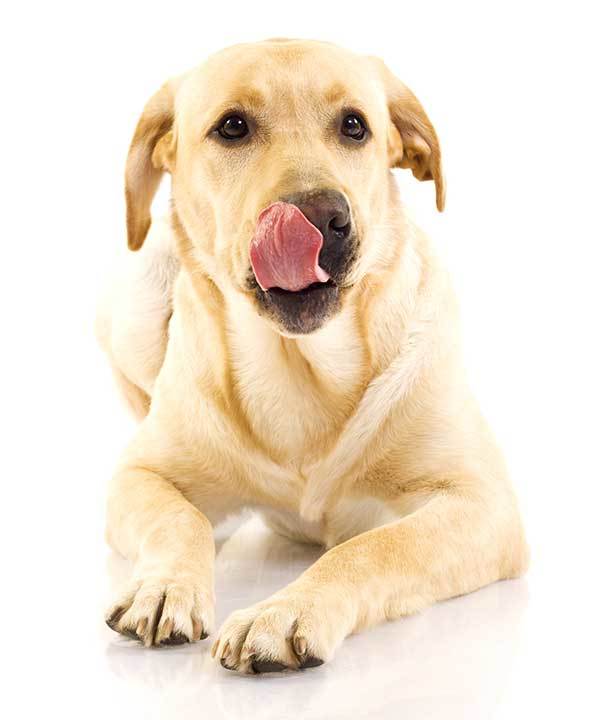
Lastly, being a powerful antioxidant, Vitamin C may counteract the adverse effects of free radicals. As a result, it helps keep chronic diseases, such as cancer, diabetes, kidney disease, and heart disease at bay.
So, perhaps you’ve been wondering, can diabetic dogs eat cabbage? And what about dogs with kidney disease, can dogs with kidney disease eat cabbage?
And the answer to both questions is yes. Not only does cabbage help keep these diseases at bay. It also boasts powerful antioxidants that prevent the conditions from degenerating into life-threatening levels. Vitamin C is especially abundant in red cabbages.
4. Regulation of Blood Pressure
As we already mentioned, blood pressure is a significant risk factor for heart disease. Thankfully, a diet of cabbage might help restore abnormal blood pressure, and continually keep it in check.
According to recent studies, a potassium-rich diet is very instrumental in regulating blood pressure.
To make that happen, potassium counteracts the harmful effects of sodium in the body. As a result, the dog excretes excess sodium through activities like peeing and sweating.
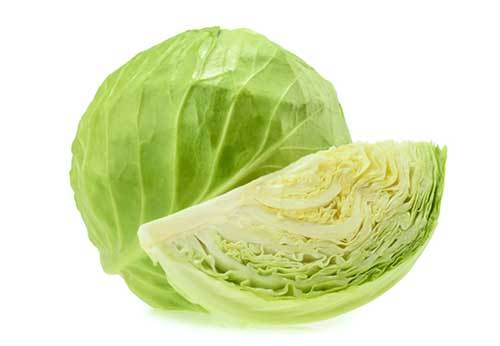
Potassium is also associated with the relaxation of blood vessels, which is significant in lowering blood pressure.
Red cabbage is rich in potassium and is a recommended inclusion in a dog’s diet. Besides potassium, cabbage is also rich in Vitamin K.
Among the many uses of Vitamin K is the fact that it acts as a cofactor for enzymes that are responsible for blood clotting.
5. Keeps Cholesterol in Check
Cabbage contains two compounds that have been shown to lower the bad LDL cholesterol.
The first compound is soluble fiber. This fiber reduces the levels of LDL cholesterol by binding with the cholesterol that’s present in your dog’s gut. As such, it prevents this cholesterol from getting absorbed into the canine’s body, thereby regularizing the dog’s overall cholesterol profile.
The second compound is plant sterols known as phytosterols. These substances block the absorption of cholesterol in the dog’s digestive tract, which again ultimately lowers the LDL cholesterol levels.
Besides the above elements, cabbage is also rich in calories and other minerals, such as manganese, magnesium, calcium, and folate. But in spite of these numerous potential benefits, is cabbage good for dogs?
To answer that question adequately, let’s now examine the potential risks of offering cabbage to your dog.
- ACTIONABLE HEALTH INSIGHTS: Test for over 270 genetic health conditions and get actionable insights to help you give your pup the best care possible….
- MOST ACCURATE BREED IDENTIFICATION: Test for over 350 dog breeds including dingoes, coyotes, wolves, and village dogs. Using a research-grade…
- TRAIT INSIGHTS THAT HELP YOU BE MORE PREPARED: Test for 55 physical traits. Size, coat, grooming needs — your dog’s traits don’t just make them…
Last update on 2025-01-13 / Affiliate links / Images from Amazon Product Advertising API
Is Cabbage Safe for Dogs?
After checking out the potential health benefits of feeding cabbage to dogs, we should now examine the possible cons. That way, we’ll be able to answer this question from the point of information.
The most obvious side effect of cabbage is gassiness. Now, gassiness may not sound like much. After all, you expect the dog to simply fart, belch, or burp and everything will be alright. Well, that’s not always the case. Gassiness comes with a host of other complications.
One of the most common symptoms of gassiness is abdominal pains. A dog that’s experiencing abdominal pains is likely to lose its appetite, and that could lead to a series of other dietary problems.
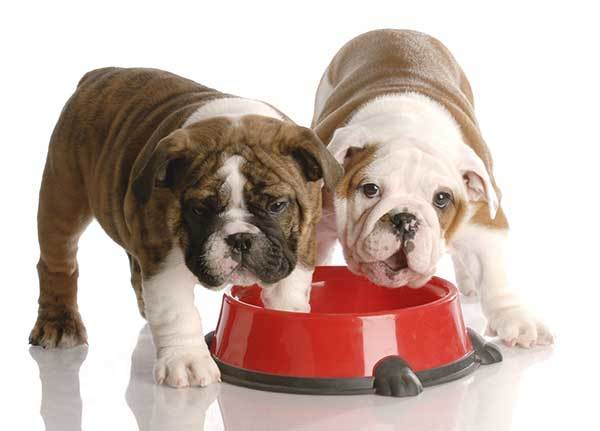
Abdominal pain is also associated with restlessness, rapid shallow breathing, and inability to lie down.
If you notice any of these signs, it’s time to seek help for your adorable pooch. Thankfully, there are numerous remedies you can apply to relieve gassiness in dogs. You might consider exercising the dog or try probiotics.
However, the most efficient method is to limit the portions of cabbage you give to the canine. And if the dog becomes bloated even after snacking on cabbage, then you might consider withdrawing the vegetable from its diet altogether.
Another common problem with cabbage is the presence of thiocyanate. Thiocyanate is a compound known to suppress the functions of the thyroid gland. If not treated with the urgency it deserves, thiocyanate might eventually lead to hyperthyroidism in dogs.
Some of the symptoms of this debilitating disease include exercise intolerance, obesity, and changes in the thickness, color, and texture of the dog’s skin.
There could be other potential dangers of cabbage for dogs. However, these are the two major ones. The good news is that the dog will need to have gulped down an excess of the vegetable to be exposed to any of the highlighted side effects.
If you continuously monitor your portions, then there’s no cause for alarm.
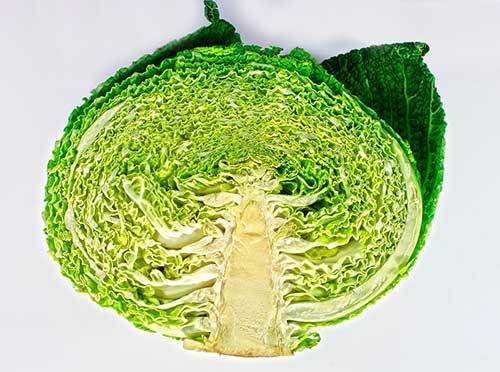
How Should I Serve Cabbage To My Dog?
Before we look at the recommended portions, we must first settle the common dilemma most pet owners often face – whether to feed raw or cooked cabbage to dogs.
Raw cabbage may appear the more appealing option. First, there’s no time to spare preparing the vegetable. You only need to wash it, chop it into bite-size portions, and then offer it to your dog.
And we also mentioned that certain cabbage varieties, such as savoy cabbage, are remarkably tender. That takes away the risks of choking. The best part about raw cabbage is that your dog gets to enjoy all the nutritional elements in the vegetable.
Indeed, all these arguments are inspired by solid research and good intentions. But can dogs eat raw cabbage?
Experts generally recommend cooking cabbage before feeding it to your dog. The drawbacks of serving raw cabbage to dogs far outweigh the benefits.
First and foremost, raw vegetable is abundant in thiocyanates. And we’ve already examined the possible health implications of this compound. Fortunately, cooking weakens the potency of thiocyanates.
Secondly, your dog might also choke on raw cabbage. Regardless of how smooth and delicate the texture may appear, you’re better off cooking the cabbage before serving it to your pooch.

But as you may expect, there are numerous ways of preparing cabbage. You might choose to grill, steam, boil, or fry the vegetable.
So, which is the best method to cook cabbage for dogs? Is boiled cabbage good for dogs? What about frying, can dogs eat fried cabbage? There’s also the option of steaming, but can my dog eat steamed cabbage?
Well, let’s start with grilled cabbage. When grilling cabbage, or any other vegetable for that matter, you’ll definitely use salt, pepper, onions, and other condiments.
As you may already be aware, dogs should not have any spices or seasonings. So, that automatically rules out grilled cabbage.
What about frying? Frying, whether deep or shallow, means you’ll be using way too much fat. It’s worse if the fat in question is processed, which is almost always the case. Besides, frying destroys a significant number of essential elements in the vegetable. Therefore, you should rule it out too.
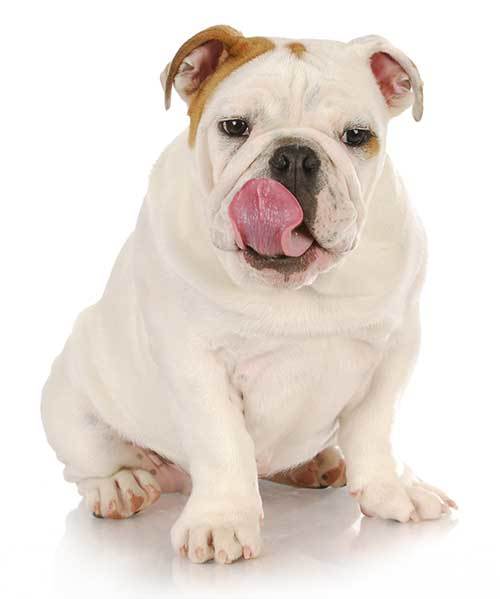
The last options left include steaming and boiling. Boiling and steaming are nearly the same, only differing in the amount of contact the vegetable has with water.
Either of these methods is encouraged. In fact, most studies conclude that vegetables supply more antioxidants to the body when they’re boiled or steamed, as opposed to when they’re raw.
Therefore, the best way to serve cabbage to dogs is to boil or steam the vegetable first. Just remember not to add any salt, condiments or spices. Instead, prepare the vegetable plain. When done, serve it to your pooch as a standalone dish or sprinkle it on top of his regular food.
So, will cooked cabbage hurt dogs? It won’t, at least if you follow the recommended methods of preparation.
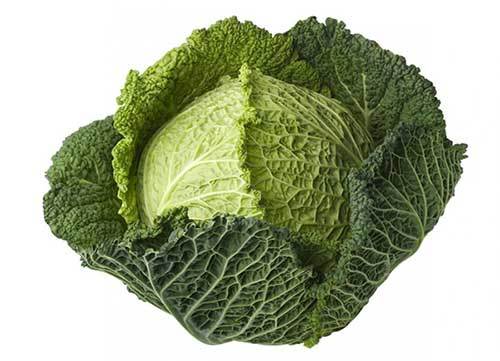
Now, besides cooking, there’s also the question of the best part of cabbage to offer to your dog.
In many cases, the cabbage from the grocery comes with two parts – the leaves [which form the head], and the stem. So, can dogs eat cabbage leaves? And what about the stems?
Cabbage leaves are perfectly fine for canines. However, shun the stems at all costs. Cabbage stems take longer to cook, and in the process, the nutrients could all be destroyed. Besides, they often host flea beetles that might find their way into your dog’s body, especially if you serve the vegetable raw.
Now, the last bit is with regards to portions. And that brings us to the question, can my dog eat cabbage every day? And how much is the recommended amount?
No, you should offer cabbage to your dog only as an occasional treat. And when you do, ensure you serve the dog just a few cabbage leaves. Introduce the vegetable to the canine slowly, watching out for any adverse reactions. If things don’t work out, consult your vet for further guidance.
- YOUR ALL-IN-ONE PET MONITOR — With Petcube Play 2 Wi-Fi pet cam, check on your pet anytime from your phone with 1080p HD video, 160° ultra…
- PLAY WITH LASER FROM YOUR PHONE — With a built-in pet and human-safe laser toy, controlled from your phone, or set to autoplay mode to entertain…
- CHAT WITH YOUR PET — With high-quality 2-way audio, you can hear and speak to your pet when away, and they can reply back. Enjoy excellent sound…
Last update on 2024-12-25 / Affiliate links / Images from Amazon Product Advertising API
Conclusion
Cabbage doesn’t feature among the foods considered toxic for dogs. That said, always monitor the portions you give to your furry friend.
When all is said and done, remember that cabbage is plant matter. And dogs are obligate carnivores. Therefore, they should do fine with their regular diet of flesh.
It’s okay to feed the vegetable to your dog occasionally, to help boost his diet and possibly manage certain health conditions. The most important thing to remember is that when feeding plant matter to pets, moderation is everything.
Checkout Our Favorite Dog Products
1. BEST PUPPY TOY
We Like: Snuggle Behavior Toy with Heart Beat & Heat Pack – Ideal toy for new puppies.
2. BEST DOG TRAINING PROGRAM
We Like: Doggy Dan The Online Dog Trainer – Stop any dog problem and raise the perfect puppy with The Online Dog Trainer.
3. BEST DOG PUZZLE TOY
We Like: Outward Hound Interactive Puzzle Toy – Every dog loves chasing squirrels at the park. The Outward Hound Hide-a-Squirrel Puzzle Toy gives your dog the same feeling as though he was outdoors chasing live squirrels.
4. Best Bone Broth for Dogs
We Like: (Solid Gold – Human Grade Bone Broth for Dogs) – Simmered Beef Bone Broth With Turmeric Provides A Nutrient-Dense And Flavorful Addition To Your Dog’s Meal + Rich In Natural Collagen From Beef Bones.
5. Best Multivitamin for Dogs
We Like: PetHonesty 10-For-1 Multivitamin – 10 Benefits in 1 Daily Treat – These Multivitamin Snacks combine a well-rounded blend of the most essential vitamins and supplements including glucosamine, probiotics, vitamins and omegas, for dogs’ overall daily health.

